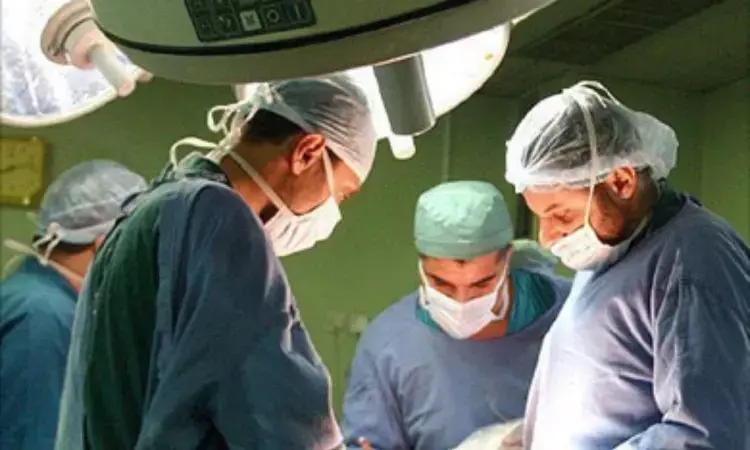- Home
- Medical news & Guidelines
- Anesthesiology
- Cardiology and CTVS
- Critical Care
- Dentistry
- Dermatology
- Diabetes and Endocrinology
- ENT
- Gastroenterology
- Medicine
- Nephrology
- Neurology
- Obstretics-Gynaecology
- Oncology
- Ophthalmology
- Orthopaedics
- Pediatrics-Neonatology
- Psychiatry
- Pulmonology
- Radiology
- Surgery
- Urology
- Laboratory Medicine
- Diet
- Nursing
- Paramedical
- Physiotherapy
- Health news
- Fact Check
- Bone Health Fact Check
- Brain Health Fact Check
- Cancer Related Fact Check
- Child Care Fact Check
- Dental and oral health fact check
- Diabetes and metabolic health fact check
- Diet and Nutrition Fact Check
- Eye and ENT Care Fact Check
- Fitness fact check
- Gut health fact check
- Heart health fact check
- Kidney health fact check
- Medical education fact check
- Men's health fact check
- Respiratory fact check
- Skin and hair care fact check
- Vaccine and Immunization fact check
- Women's health fact check
- AYUSH
- State News
- Andaman and Nicobar Islands
- Andhra Pradesh
- Arunachal Pradesh
- Assam
- Bihar
- Chandigarh
- Chattisgarh
- Dadra and Nagar Haveli
- Daman and Diu
- Delhi
- Goa
- Gujarat
- Haryana
- Himachal Pradesh
- Jammu & Kashmir
- Jharkhand
- Karnataka
- Kerala
- Ladakh
- Lakshadweep
- Madhya Pradesh
- Maharashtra
- Manipur
- Meghalaya
- Mizoram
- Nagaland
- Odisha
- Puducherry
- Punjab
- Rajasthan
- Sikkim
- Tamil Nadu
- Telangana
- Tripura
- Uttar Pradesh
- Uttrakhand
- West Bengal
- Medical Education
- Industry
Intraoperative aggressive warming does not reduce major complications

Body temperature generally decreases during surgery, largely because anesthetic medications interfere with the body's processes for regulating temperature. While practices vary around the world, nursing staff in Western countries typically use forced-air heaters to keep patients warm during surgery, with a target temperature of 36 C, or 96.8 F.
Aggressive intraoperative warming during major noncardiac surgery did not reduce complications including myocardial injury, site infections, transfusion requirement or hospitalization stay compared to patients kept at cooler body temperatures, finds a new study. Further patients kept at a body temperature of 37 C during major surgery had no fewer cardiac complications than patients kept at 35.5 C,
The data of the study was presented at the American College of Cardiology's 71st Annual Scientific Session and simultaneously published online in The Lancet at the time of presentation.
This trial, one of the largest to date, sought to determine whether warming patients even more-to 37 C, or 98.6 F-would reduce the risk of cardiac complications, which are a leading cause of death in the first 30 days after major surgery.
Results showed no significant differences between groups for the trial's primary endpoint, a composite of troponin elevation due to ischemia (an indicator of heart injury), non-fatal cardiac arrest or death from any cause within 30 days after surgery. Researchers also reported no differences for any of the trial's secondary endpoints.
"This trial tells us that there is no benefit to aggressively warming patients to 37 C during surgery. It is simply unnecessary, and it doesn't improve any substantive outcomes," said Daniel I. Sessler, MD, Michael Cudahy professor and chair of the Department of Outcomes Research at Cleveland Clinic and the trial's lead author. "Also, the results show that 36 C should not be considered the threshold for defining mild hypothermia since there was no harm at 35.5 C."
The researchers enrolled 5,050 patients who had surgery at 13 medical centers, mostly in China. Participants had various major noncardiac surgical procedures, with a minimum duration of two hours and an average duration of four hours. Half of the patients were randomly assigned to receive routine care, with a target body temperature of 35.5 C, while half received aggressive warming, with a target body temperature of 37 C.
For patients assigned to routine care, nursing staff put a warming cover in position but did not activate it until the patient's body temperature decreased to less than 35.5 C, resulting in an average group body temperature of 35.6 C. With the more aggressive warming protocol, nurses covered patients with a heated blanket for 30 minutes before surgery and then used two forced-air heaters to keep patients warmed to a mean of 37.1 C during surgery.
In addition to seeing no benefit in terms of the composite primary endpoint, the trial reported no significant differences between groups in terms of serious wound infections, length of hospitalization, hospital re-admissions or the need for blood transfusions. The investigators were surprised that rates of wound infections and transfusions were similar to previous studies, which suggested that both were more common in patients maintained at lower body temperatures.
Nearly all patients were enrolled in China, Sessler said, but the results should be generalizable to patients and health care settings in other countries.
"This study shows that it is reasonable to keep patients warm, but we saw no evidence whatsoever that it makes a difference if they're just above or just below 36 C," Sessler said. "Surgical patients should still be warmed, but there's no need to be super-aggressive about the warming."
The study did not assess less serious or non-medical outcomes, such as patient comfort or shivering. Sessler said that patients maintained at a lower body temperature may shiver or feel cold after surgery, but both are temporary and unlikely to have a meaningful health impact.
Dr Kamal Kant Kohli-MBBS, DTCD- a chest specialist with more than 30 years of practice and a flair for writing clinical articles, Dr Kamal Kant Kohli joined Medical Dialogues as a Chief Editor of Medical News. Besides writing articles, as an editor, he proofreads and verifies all the medical content published on Medical Dialogues including those coming from journals, studies,medical conferences,guidelines etc. Email: drkohli@medicaldialogues.in. Contact no. 011-43720751


